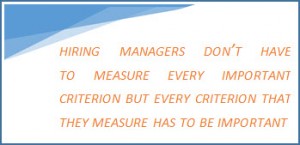I was working with a client recently who was struggling to fill a job opening for an Analyst. Human resources had posted the job and gone through several slates of applicants, but the hiring manager was never satisfied with the candidates. I realized that there were several possibilities for this disconnect, but I decided to start at the most basic level of identifying the key criteria in the talent selection process (I’ll be addressing other potential downstream issues like selection tools in the coming months in this blog).
 In addressing this situation I took several job experts (including the hiring manager) through a simple exercise of identifying and documenting the criteria required for success in the Analyst role. In this review I purposely included criteria from the job posting as well as a few others based on my experience with similar types of roles. With only about half of the posting’s original criteria considered important and required at entry, the point of the exercise became clear to participants: the hiring manager had been vetting candidates based on only 50% of the key criteria! The hiring manager instinctively knew that the candidates were not appropriate but he could not explain why.
In addressing this situation I took several job experts (including the hiring manager) through a simple exercise of identifying and documenting the criteria required for success in the Analyst role. In this review I purposely included criteria from the job posting as well as a few others based on my experience with similar types of roles. With only about half of the posting’s original criteria considered important and required at entry, the point of the exercise became clear to participants: the hiring manager had been vetting candidates based on only 50% of the key criteria! The hiring manager instinctively knew that the candidates were not appropriate but he could not explain why.
This type of scenario happens all too frequently in the corporate world and, unfortunately, it goes one step further: unaware of the true success criteria, hiring managers “go with their gut”, which ends up amounting to a guessing game. (To bring this point to bear, I once had a hiring manager tell me “I always go with my gut – in case you hadn’t noticed it’s 10 times bigger than my head!”)
 Recent research suggests that about 40% of companies fail to thoroughly identify the experiences, competencies, and characteristics required for successful performance on the job1. As a result, these organizations and their hiring managers are not really sure what they are looking for in candidates. While their hiring tools may help them evaluate potential employees, hiring managers may end up assessing and differentiating them based on incorrect criteria.
Recent research suggests that about 40% of companies fail to thoroughly identify the experiences, competencies, and characteristics required for successful performance on the job1. As a result, these organizations and their hiring managers are not really sure what they are looking for in candidates. While their hiring tools may help them evaluate potential employees, hiring managers may end up assessing and differentiating them based on incorrect criteria.
In tackling this challenge I recommend to my clients that they think broadly when identifying the requisite criteria – the only caveat being that hiring managers don’t have to measure every important criterion but every criterion that they measure has to be important.
Here are the criteria I stress when collaborating with job experts:
- Education and experience, which shape the candidate pool by attracting (or deterring) candidates that have (or don’t have) the appropriate background.
- General cognitive ability, which predicts job performance in all jobs; job-specific aptitude may also be critical to success.
- Personality characteristics, such as conscientiousness, which uniquely predict performance above and beyond cognitive ability and balance out the adverse impact caused by cognitive tests.
- Core (e.g., people management) and functional competencies (e.g., financial acumen), which provide additional measurement breadth.

A few key takeaways. First, an analysis of the criteria should be conducted prior to posting a job. Second, criteria should be reviewed and revised as necessary every three to five years to ensure that they are up to date.
Third, the criteria should serve as the foundation for your organization’s evaluation tools and techniques.
In next month’s blog, I will be providing an overview of evaluation techniques, including the principles of job relatedness, consistency, standardization and structure.
To discuss your specific talent selection issues and challenges, please contact me at 203-817-7522.Please use the text box below to leave your comments and to ask questions. In addition, please take 3-minutes to complete an anonymous survey that will help drive discussion as well as inform subsequent blog posts.
1 Global Selection Forecast Report (2012)

